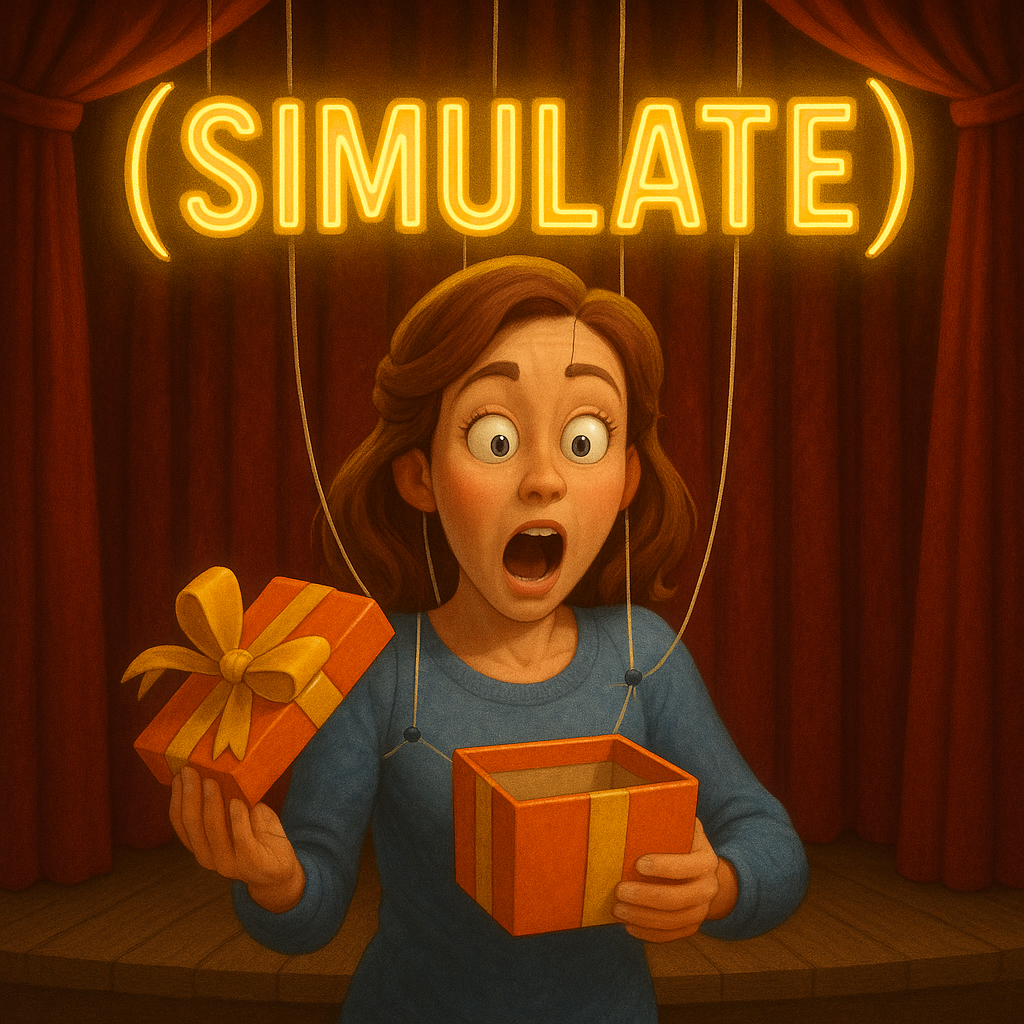Simulate
Definition
Simulate means to imitate or reproduce the appearance, character, or behavior of something; to create a model or representation for the purpose of study or training. It is most commonly used as a transitive verb.
Parts of Speech
- Verb (transitive)
Pronunciation
American English
- IPA: /ˈsɪm.jə.leɪt/
- Respelling: SIM-yuh-layt
British English
- IPA: /ˈsɪm.jʊ.leɪt/
- Respelling: SIM-yuh-layt
Etymology
Early 17th century: from Latin simulāre ‘to make like, imitate,’ from similis ‘like, similar.’
Derivatives
- simulated (adjective, verb past)
- simulating (verb gerund)
- simulation (noun)
- simulator (noun)
- simulable (adjective)
Synonyms
- imitate
- emulate
- mimic
- replicate
- feign
Antonyms
- originate
- create
- genuine
- real
Usage
"Engineers simulate bridge stress under heavy loads before construction."
"Actors sometimes simulate emotions they do not genuinely feel."
Related Terms
- Simulation: The act or process of simulating.
- Model: A representation used to study a system.
- Emulate: To strive to equal by imitating.
- Mimicry: Close imitation, often for effect.
- Replica: An exact copy or reproduction.
Detailed Definitions
Verb
- To reproduce the appearance or characteristics of – to create a representation that closely matches the look, behavior, or function of something else.
- Example: "The software can simulate planetary orbits with high accuracy."
- To create a model or representation for training or analysis – to set up a controlled scenario that mimics real conditions for practice or study.
- Example: "Pilots simulate emergency procedures in a flight simulator."
- To feign or pretend (a feeling, condition, or action) – to act as if experiencing a state or emotion not genuinely felt.
- Example: "She simulated surprise when she saw the gift."
simulate



🇨🇳 Mandarin (Simplified Chinese)
- 模拟 (mónǐ)
- IPA Pronunciation: /mu̯o˨˩˦ ni˨˩/
- Respelling in English: mo-nee
🇮🇳 Hindi
- अनुकरण करना (anukaraṇ karnā)
- IPA Pronunciation: /ənʊˈkəɾən kəɾnɑː/
- Respelling in English: anu-karan kar-naa
🇪🇸 Spanish
- simular
- IPA Pronunciation: /simuˈlaɾ/
- Respelling in English: see-moo-LAR
🇫🇷 French
- simuler
- IPA Pronunciation: /simyle/
- Respelling in English: see-mu-LAY
🇸🇦 Modern Standard Arabic
- محاكاة (muḥākāh)
- IPA Pronunciation: /muːˈħaːkaː/
- Respelling in English: moo-HAA-kah
🇧🇩 Bengali
- অনুকরণ করা (anukaraṇ karā)
- IPA Pronunciation: /ɔnukɔron kɔɾa/
- Respelling in English: onu-koron kora
🇷🇺 Russian
- моделировать (modelirovat')
- IPA Pronunciation: /mədʲɪˈlʲirəvətʲ/
- Respelling in English: mo-dee-LEE-ro-vat
🇵🇹 Portuguese
- simular
- IPA Pronunciation: /simuˈlaɾ/
- Respelling in English: see-moo-LAR
🇮🇩 Indonesian
- mensimulasikan
- IPA Pronunciation: /mən.simʊ.la.si.kan/
- Respelling in English: men-see-moo-la-SEE-kahn
🇩🇪 German
- simulieren
- IPA Pronunciation: /ziːmuːˈliːʁən/
- Respelling in English: zee-moo-LEER-en
🇯🇵 Japanese
- シミュレートする (shimyurēto suru)
- IPA Pronunciation: /ɕimjɯɾeːto sɯ̥ᵝɾɯ̥ᵝ/
- Respelling in English: shee-myoo-RAY-to soo-roo
🇻🇳 Vietnamese
- mô phỏng
- IPA Pronunciation: /mɔ˧˥ phɔjŋ˧˥/
- Respelling in English: moh fawng
🇰🇷 Korean
- 시뮬레이트하다 (simyulleiteuhada)
- IPA Pronunciation: /ɕimjul.le.itʰada/
- Respelling in English: shee-myool-LAY-tuh-ha-da
🇹🇷 Turkish
- simüle etmek
- IPA Pronunciation: /simyle etmek/
- Respelling in English: see-MOO-lay et-mek
🇵🇰 Urdu
- نقل کرنا (naql karnā)
- IPA Pronunciation: /nəql kəɾnɑː/
- Respelling in English: naql kar-naa





